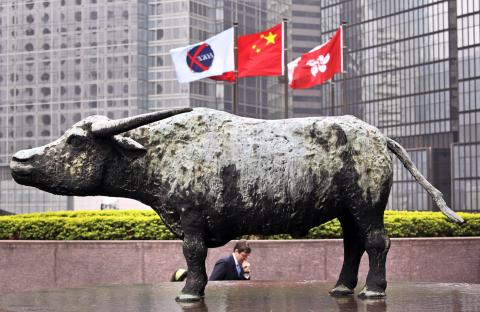Hong Kong is speeding up approval of work visas for professionals fleeing quake-hit Japan, immigration officials said yesterday, as the territory tries to snap up top-class staff in the finance sector.
The Hong Kong Immigration Department said 270 one-year visas from people leaving Japan were approved through an expedited system that took only two days, compared with the usual four-to-six weeks.
HIGH-LEVEL APPLICANTS

Photo: EPA
The applications were received between March 17 and Thursday last week from high-level managers and professionals at multinational companies in the finance -industry earning between HK$100,000 (US$13,000) and HK$200,000 a month, a spokesman said.
“Countries all around the world are fighting over talent exiting Japan because of the earthquake,” the department’s information officer Angus Leung (梁士初) told reporters.
“We hope that they will consider Hong Kong,” he said, adding that the government had received 600 enquiries from high-end financial workers in Japan since the disaster.
Japan is struggling to recover from the March 11 quake and tsunami, which battered the northeast coast and crippled a nuclear power plant 250km from Tokyo, causing radiation leakages and fears of contamination.
SCHOOLS
The Hong Kong International School and Hong Kong Japanese School said they had received an increase in enquiries and applications from parents looking for child places.
They could not immediately provide an exact figure.
However, some banks said they would keep their staff in Japan.
A spokesman from Citigroup’s Hong Kong office said the company was not facilitating any permanent moves and that all of its Tokyo-based employees will remain in the city.
Luxury hotels in Hong Kong — the JW Marriott, Four Seasons and Shangri-La — have seen a jump in room requests from firms moving staff and individuals fleeing the stricken country.
The Bank of Japan said -yesterday that businesses’ confidence in the outlook for the next three months had plunged following the March 11 disaster and subsequent nuclear crisis.

SEEKING CLARITY: Washington should not adopt measures that create uncertainties for ‘existing semiconductor investments,’ TSMC said referring to its US$165 billion in the US Taiwan Semiconductor Manufacturing Co (TSMC, 台積電) told the US that any future tariffs on Taiwanese semiconductors could reduce demand for chips and derail its pledge to increase its investment in Arizona. “New import restrictions could jeopardize current US leadership in the competitive technology industry and create uncertainties for many committed semiconductor capital projects in the US, including TSMC Arizona’s significant investment plan in Phoenix,” the chipmaker wrote in a letter to the US Department of Commerce. TSMC issued the warning in response to a solicitation for comments by the department on a possible tariff on semiconductor imports by US President Donald Trump’s

‘FAILED EXPORT CONTROLS’: Jensen Huang said that Washington should maximize the speed of AI diffusion, because not doing so would give competitors an advantage Nvidia Corp cofounder and chief executive officer Jensen Huang (黃仁勳) yesterday criticized the US government’s restrictions on exports of artificial intelligence (AI) chips to China, saying that the policy was a failure and would only spur China to accelerate AI development. The export controls gave China the spirit, motivation and government support to accelerate AI development, Huang told reporters at the Computex trade show in Taipei. The competition in China is already intense, given its strong software capabilities, extensive technology ecosystems and work efficiency, he said. “All in all, the export controls were a failure. The facts would suggest it,” he said. “The US

The government has launched a three-pronged strategy to attract local and international talent, aiming to position Taiwan as a new global hub following Nvidia Corp’s announcement that it has chosen Taipei as the site of its Taiwan headquarters. Nvidia cofounder and CEO Jensen Huang (黃仁勳) on Monday last week announced during his keynote speech at the Computex trade show in Taipei that the Nvidia Constellation, the company’s planned Taiwan headquarters, would be located in the Beitou-Shilin Technology Park (北投士林科技園區) in Taipei. Huang’s decision to establish a base in Taiwan is “primarily due to Taiwan’s talent pool and its strength in the semiconductor

French President Emmanuel Macron has expressed gratitude to Hon Hai Precision Industry Co (鴻海精密) for its plan to invest approximately 250 million euros (US$278 million) in a joint venture in France focused on the semiconductor and space industries. On his official X account on Tuesday, Macron thanked Hon Hai, also known globally as Foxconn Technology Group (富士康科技集團), for its investment projects announced at Choose France, a flagship economic summit held on Monday to attract foreign investment. In the post, Macron included a GIF displaying the national flag of the Republic of China (Taiwan), as he did for other foreign investors, including China-based